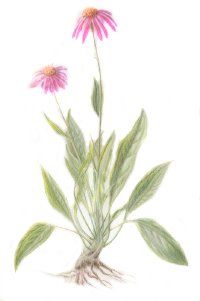This showy perennial was used by the Native Americans and adopted by the early settlers as a medicine. Members of the medical profession in early America relied heavily on echinacea, but it fell from favor with the advent of pharmaceutical medicine and antibiotics. Many physicians are rediscovering the benefits of echinacea. Many forms of echinacea are available to choose from; Germany has registered more than 40 different echinacea products.
Long used for infectious diseases and poor immune function, echinacea extractions also are used today to help treat influenza, colds, chronic fatigue syndrome, and AIDS. Research has shown echinacea stimulates the body's natural immune function. It does so by increasing the activity of white blood cells, raising the level of interferon, and stimulating blood cells to engulf invading microbes. Echinacea also increases the production of substances the body produces naturally to fight cancers and disease.
Besides its use as an immune stimulant, echinacea is recommended for individuals with recurring skin lesions, such as boils, and as a tonic to improve the liver's ability to reduce the effects of environmental toxins.
